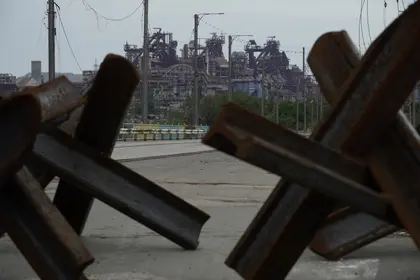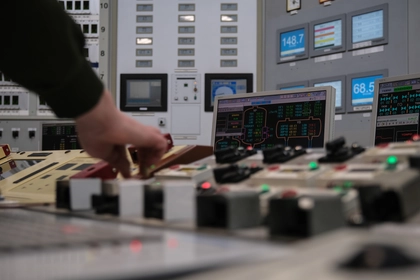From Bucha, the town synonymous with massacre allegations, to the "Z" symbol for Russia's attack on its neighbour, here are some of the words that have defined the last 12 months of war in Ukraine.
- Azovstal -
JOIN US ON TELEGRAM
Follow our coverage of the war on the @Kyivpost_official.
One of the largest metal mills in Europe, the Azovstal steel plant in the eastern Ukrainian city of Mariupol went down in history as a symbol of Ukrainian resistance to Russia's invasion.
The fighters inside Azovstal withstood attacks by the Russian army for weeks, when the rest of the city had fallen after a devastating siege.
The troops, including fighters from the Azov regiment that Moscow describes as a neo-Nazi organisation, took shelter in a warren of tunnels beneath the plant.
They finally surrendered in May 2022 as they ran out of food, ammunition and medicine, but remained heroes in the eyes of Ukrainians.
Some were later released in prisoner exchanges with Russian forces. Others are still held by Moscow.
- Bucha -
Bucha, a quiet commuter town northwest of the Ukrainian capital Kyiv, has become a byword for alleged Russian war crimes.
Russian troops are accused of massacring civilians in Bucha, which they occupied for more than a month in early 2022.
AFP journalists were the first reporters to discover the horrors of Bucha after the Russians retreated in late March.
They discovered Ukrainians dressed in civilian clothes, shot dead and some with their hands tied behind their backs.

Thinking Out Loud – Where We’re at, What’s at Stake, and What Ronald Would Have Said
Ukraine and the West say the Russian army committed war crimes in Bucha and elsewhere, pointing to an abundance of footage and witness accounts.
Moscow denies the accusation, claiming the atrocities in Bucha were staged.
- HIMARS -
The High Mobility Artillery Rocket System (HIMARS) is a US truck-mounted unit that can launch multiple precision-guided rockets at the same time, reaching targets up to 80 kilometres (50 miles) away.
The systems, which Washington delivered to Ukraine in June 2022, are widely seen as one of the most effective tools in the counter-offensive Ukraine mounted against Russian forces last summer and autumn.
HIMARS seriously damaged Russian supply lines and weapons depots, helping to force Moscow's fighters to pull back from the northeastern Kharkiv region and abandon the southern city of Kherson.
Since then, Russia has positioned its depots further back from the front lines, leading Kyiv to urge its Western allies to provide even longer-range weapons.
After months of hesitation, the United States announced on February 3 that it would send rocket-propelled precision bombs called GLSDBs, which could nearly double Ukraine's strike range.
- Mobiki -
Ukrainians use this term for the hundreds of thousands of Russian reservists called up by President Vladimir Putin since September to boost Moscow's troop numbers, following a series of battleground defeats.
Accounts gathered by AFP or posted on social media say these soldiers are often poorly trained and equipped, and rely on family to send them sometimes the most basic of equipment.
Kyiv says the Kremlin is using these reservists as cannon fodder, deploying waves of "mobiki" to exhaust Ukrainian forces by numerical superiority, whatever the human losses that entails.
- Orcs -
The Ukrainian authorities regularly compare Russia to "Mordor", the realm of the power-hungry tyrant Sauron in J.R.R. Tolkien's "Lord of the Rings" trilogy.
Russian fighters have become "Orcs" -- Sauron's cruel and ugly humanoid soldiers.
This pejorative epithet first appeared online before making its way into the lexicon of Ukrainian officials.
Another common term is "Rascist", a conflation of "Russian" and "fascist".
- SVO -
"Special military operation" or its Russian acronym SVO is the euphemism used by the Kremlin to refer to its war on Ukraine.
Russia has passed a law banning the use of the words "war" and "invasion" in reference to its neighbour.
In Russia, "war" is a term reserved for the offensive Moscow says the West is waging against it.
- Ukronazi -
Putin justified his invasion by an alleged need to "de-Nazify" Ukraine, which he accused of trying to eliminate its Russian-speaking minority.
Russian propagandists refer to Ukrainians as "Ukronazis".
- 'Go fuck yourself' -
The Russian navy captured Snake Island in the Black Sea shortly after the invasion was launched on February 24, 2022 and ordered the Ukrainian contingent on the small, strategically located outcrop to surrender.
The Ukrainian soldiers became a symbol of their country's resistance when they told the crew of the attacking Russian warship, the Moskva, to "go fuck yourself".
The exchange went viral, appearing on internet memes, placards at pro-Ukraine rallies abroad and on a Ukrainian stamp showing a soldier making an obscene gesture in the warship's direction.
The Moskva, the flagship of Russia's Black Sea fleet, sank in mid-April following what the Kremlin said was an explosion on board. Ukraine said its forces hit it with missiles.
Russian forces left Snake Island in June.
- 'Z' -
The letter "Z" daubed on many of the Russian tanks deployed in Ukraine has become a symbol of the war, for both supporters and detractors.
For the pro-war contingent, who use it on public buildings, cars and clothes, "Z" is a rallying sign.
Opponents of the conflict see it as an emblem of Putin's regime, along with the Nazi swastika, which has seen it mutate into "Zwastika".
You can also highlight the text and press Ctrl + Enter






